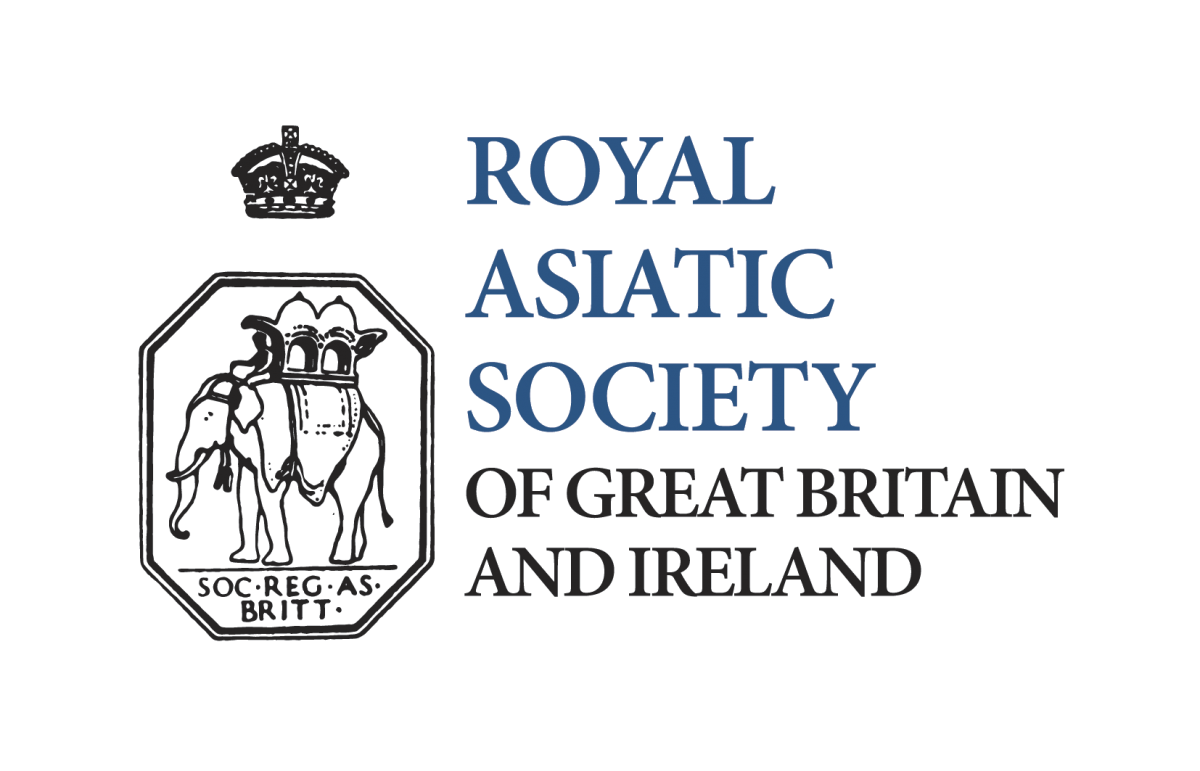Online Events and Archival Progress…
This afternoon, Tuesday May 26th, the Royal Asiatic Society in conjunction with the British Council, Georgia, hosted a zoom lecture by Zaza Purtseladze on the “Educational and Cultural landscape in Georgia – current challenges and priorities”. The talk was introduced by Richard Everitt, the British Council’s Regional Director of Education and Society for Wider Europe and a RAS Fellow. In his talk Zaza, who is Director of South Caucasus (Armenia, Azerbaijan and Georgia) for the British Council, spoke on the educational and cultural challenges facing Georgia both in the immediate Covid-19 environment and in its more medium and longer-term priorities. He was joined by Sophie Barishvili who spoke about the scholarship and fellowship opportunities provided to both Masters students and those in entrepreneurial and influential positions by the British Council. Zaza also outlined the British Council’s English Learning Hub programme in rural areas to bring both English and technological skills to remote regions and the Creative Spark programme working with higher education students, before focusing on the cultural and heritage sector. The joint UK/GE Season of 2019 provided over 60 events in 3 months which were accessed both physically and through technology.
A lively question and answer session followed with participants from around the world. Zaza was aided by Maya Darchia, British Council South Caucasus (Arts) to answer some of the questions on arts and culture within Georgia. We would like to thank everyone for dialling in and taking part, and would particularly like to thank Zaza and his team for such an interesting talk.
We would also like to bring your attention to these online events available from RAS Korea:
Thursday, May 28. 07:00~09:00 PM (Seoul) [Online Korean Literature Club]
‘Romantic Tales from Old Korea’ (Compiled by Brother Anthony of Taize)
Leader: Yonjoo Hong & Brother Anthony
and if you would like to catch up with their online lectures you can find and watch them via the links below.
RAS Korea Online Lecture Videos
– SAMSUNG RISING (by Geoffrey Cain)
– Practicing Korean Traditional Archery (by In-Souk Cho)
– Witnessing Gwangju (by Paul Courtright)
You might also like to read this report from The Korea Times on the activities and history of the Korea branch.
~ ~ ~ ~ ~
You may remember that before we went into lockdown, I wrote two blogposts concerning the progress within the archives over the years I have been at the Royal Asiatic Society. In the first, I wrote about early identification of material and the cataloguing of the majority of the Personal Papers. In the second blog post, I wrote about the separation of the archives into different categories and began to elucidate on the work done with the Institutional Archives of the Royal Asiatic Society, specifically covering those archives connected to Allied Societies and Awards and Medals.
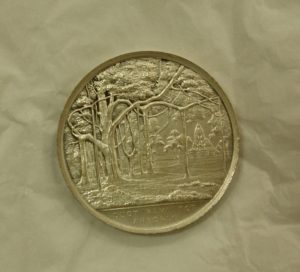
This blog post, I will continue to outline the progress made within the institutional archives. While we have been in lockdown, I have been able to continue working with these records in two distinct ways. I have drafted further retention schedules. These define the records created in the business of the Society and for how long each type of record should be kept. Creating these will help in sorting historic records when we return to the building and in maintaining current records for their appropriate time period.
I have also been cataloguing a handwritten volume of correspondence dating to the early years of the Society as mentioned in a previous blog. I don’t have the book at home but have been able to work from a list previously created by one of our volunteers, Ian Scholey, to make the catalogue. The volume contains over 500 letters all relating to the business of the Society and reveals the excellent record-keeping that was happening at the time. It seems that the majority of the outgoing correspondence was copied into the book. This is one of two volumes that we have. Before lockdown, Ian had begun working on the second, so it will be interesting to discover in what ways they show similarities and differences.
As you will see as we look at further categories in the Institutional Archives some have had more work completed on them than others. An archivist’s work is never done… especially when it comes to institutional records as they keep on getting made.
Collections
These are the records created in, for example, the care, accession, access, and loan of the collections of the Society. A retention schedule has been created for these Collections records. Several catalogues have already been created. These are:
- RAS COLL1: Royal Asiatic Society Collections: Library Committee Minutes
- RAS COLL2: Royal Asiatic Society Collections: Policy Documents
- RAS COLL3: Royal Asiatic Society Collections: Acquisition Records
- RAS COLL4: Royal Asiatic Society Collections: Disposal Records
- RASCOLL5: Royal Asiatic Society Collections: Research Registration Records
These are only a small percentage of the total records in this area. Other catalogues that will need to be made include those for Research Enquiries, Loans, Conservation, Lists and Catalogues, Production of Educational Material, and Applying for Grants. Some of these records are already in the archives, some are still within the offices and will need sorting and their retention schedule applying to them.
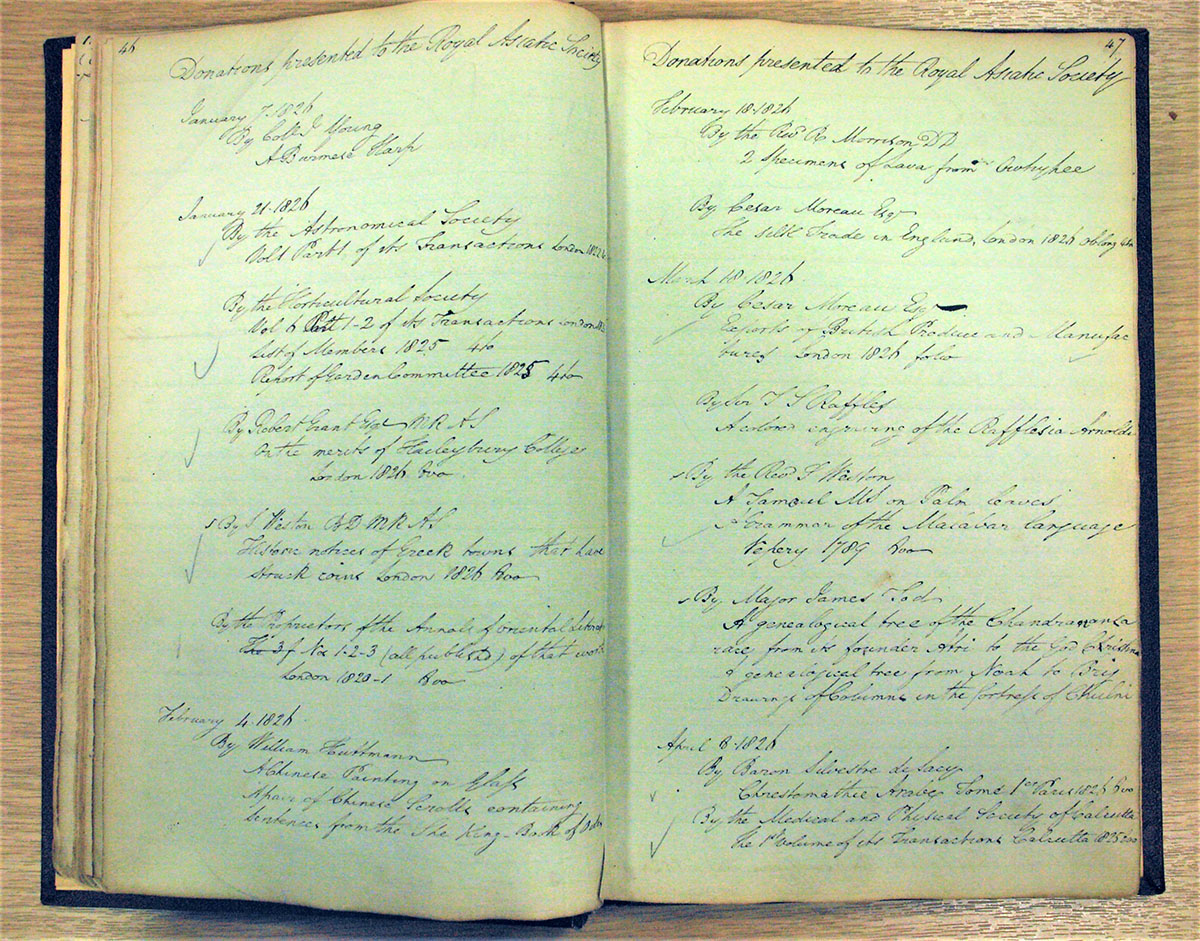
Finance
A retention schedule has been created for finance documents and a first sort of the archival material has been undertaken to weed out material for disposal. Some material has been taken and sorted from the Executive Officer’s files but not all. The catalogues completed so far are just those for:
- RAS FIN1: Royal Asiatic Society Finance: Minutes of Finance and Investment Committees
Other categories for catalogues would include Annual Accounts, Financial Regulations, Audits, Bequests and Donations, Charity Commission, Grant Applications, Insurance policies, and Monitoring Grants.
Governance
A retention schedule has been created for Governance Documents but has not yet been fully applied to material in the archives or offices. The catalogues completed so far are:
- RAS GOV1: Royal Asiatic Society Governance: Minutes of Council Meetings
- RAS GOV2: Royal Asiatic Society Governance: Preliminary Correspondence
- RAS GOV3: Royal Asiatic Society Governance: Royal Patronage
The material for Charters and Byelaws has been extracted from the other material and put in one box ready for cataloguing. The book of correspondence I am currently cataloguing will become RAS GOV4: Royal Asiatic Society Governance: Correspondence Volume One.
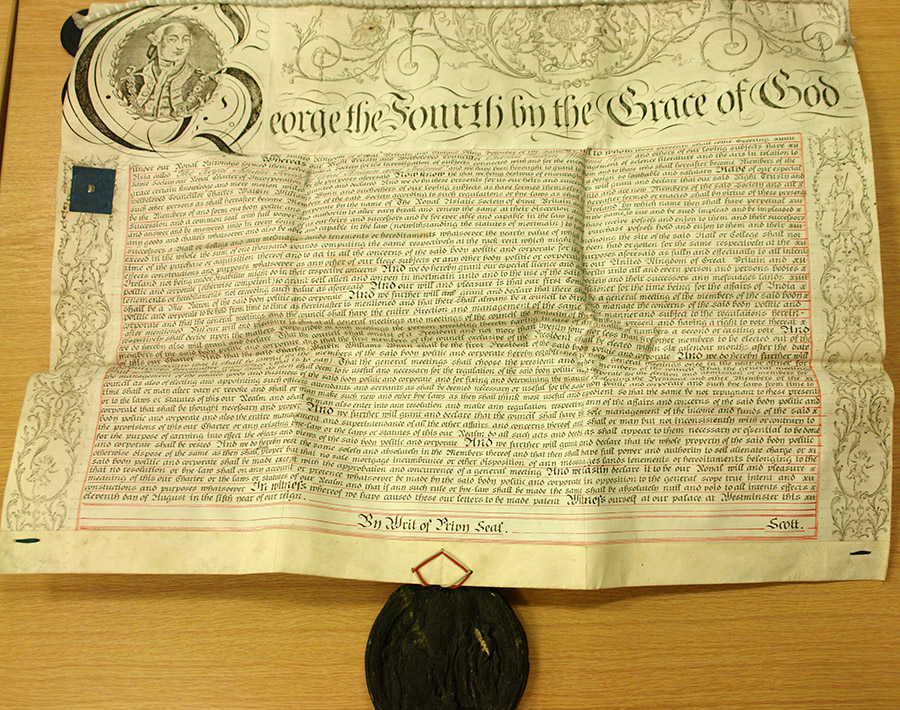
Journal
Little work has been done on this category. The material is listed that is already in the archives but none has been extracted from the offices. A retention schedule has not yet been created. As you will have seen from Charlotte’s blog post, the Journal is an important part of the Society’s activities and therefore there will be many records in connection with it.
Lectures and Events
A retention schedule has been created but little sorting of the archives have happened beyond listing. However the following catalogues have been created:
- RAS LEC1: Royal Asiatic Society Lectures and Events: Minutes of General Meetings
- RAS LEC2: Royal Asiatic Society Lectures and Events: Minutes of Events and House Committee (it was decided to put these in this category though they also contain details relating to property)
Further to these catalogues, there are also the catalogues for all the major anniversaries of the society. As these were a mixture of events, exhibitions etc., there were each catalogued as separate entities.
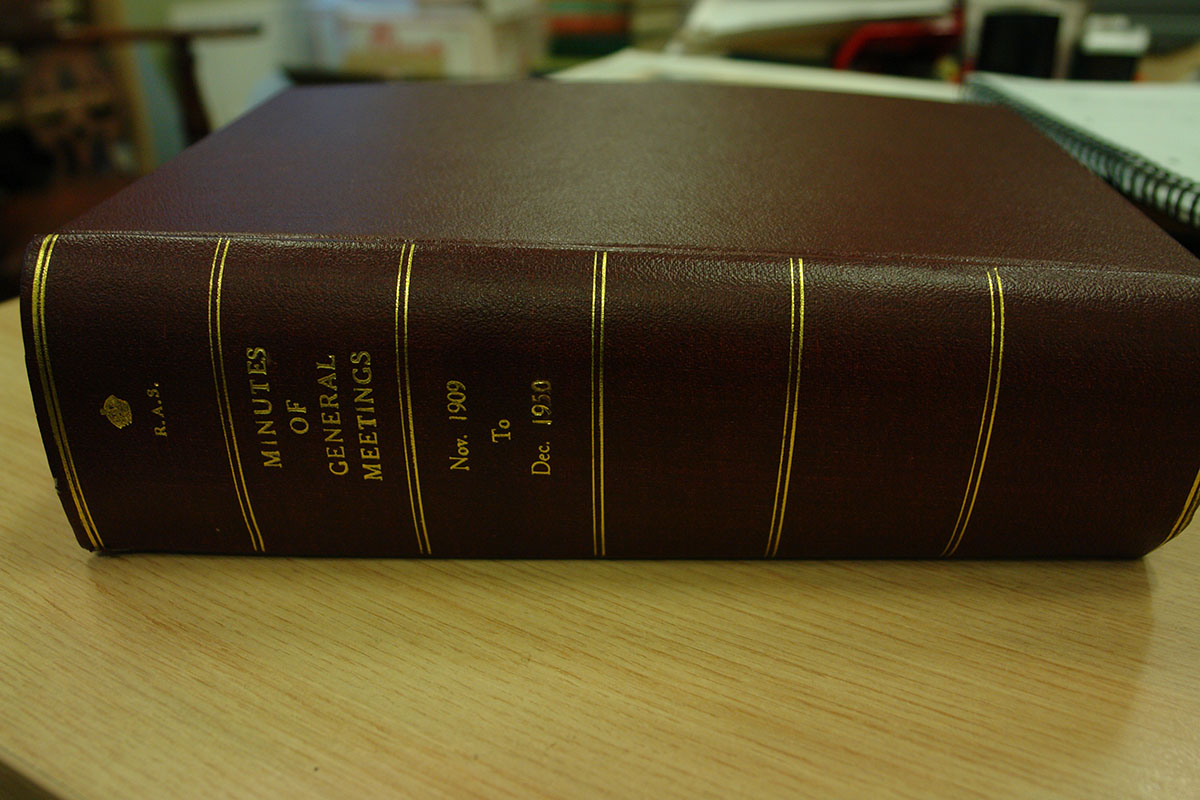
These are just some of the sections for the institutional archives. The rest can wait for a future post, as can the other material for which I care. Please do browse through all the catalogues available on Archives Hub and in our online Library Catalogue hosted by Koha. These provide information of many of our collections. For visual representations of some of our Collections then we have our Digital Library. Further collections have been added during lockdown, so please take the chance of viewing these and using them for your pleasure or for your research,
